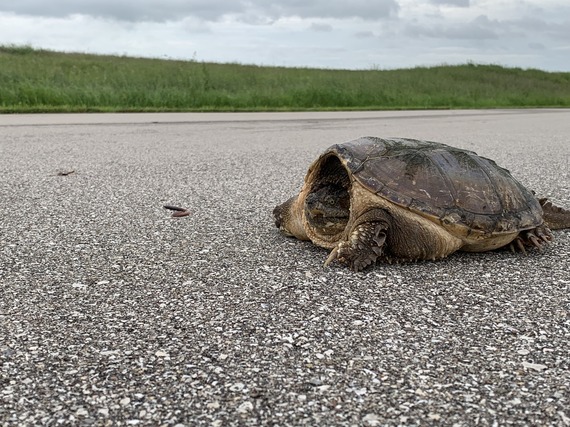
Researchers at Purdue University are studying the willingness of hunters and non-hunters to reduce the spread of chronic wasting disease (CWD) in white-tailed deer.
CWD is a fatal neurological disease affecting deer and is caused by a misfolded prion that damages the animal’s nervous system. CWD is contagious to deer and can spread through deer-to-deer contact or through contaminated environments. No cases of CWD have been recorded in humans.
Information collected may help inform Indiana DNR’s response to CWD. Participants will answer online survey questions and use a web app that shows how CWD may spread. The activity and survey questions take about 30 minutes to complete. The study is open to everyone 18 years old or older. If you have already completed the survey, you are now able to participate again. All that is required to participate is a computer or tablet. Participate in the study online.
For questions about this study, please email the research team at

This summer, more turtles will be crossing roadways to find a place to nest. Here’s how you can lend a helping hand:
Turtles that are crossing roads should not be removed from the area, as they will seek to return to their home range, even if it means spending the rest of their life trying. If it is safe to do so, you can move turtles off the roadway in the same direction they were already heading. Move them by grasping the back of the top shell.
If you see a snapping turtle trying to cross the road, be aware that grabbing a snapping turtle’s tail can damage its spine. Instead, snapping turtles can be held by the top of the back of their shell and leveraged upward to handle them safely for both parties.
Turtles DO NOT make good pets!
• Turtles require time and money for proper care, and some species can live up to 50 years or more.
• Pet turtles do not like to be held and are loners; therefore, they can become boring pets for children. Without this special light, many health issues arise such as metabolic bone disease.
• It is very important to know what kind of species you want and the care it needs before you acquire a pet turtle. Many need special food and tanks.
◦ Each species has different feeding requirements, with some being strictly carnivores or herbivores. Northern map turtles, for example, have restricted diets that must include snails, aquatic insects and crayfish. Some species of aquatic turtles, such as the red-eared slider, northern map turtle, and softshells, grow up to 12 inches long, requiring a large tank for swimming and basking.
• Land turtles need a large pen, with sufficient substrate, properly sized water bowl, and a hide area, as well as heat. Some require more humidity than others.
• If you no longer want your pet turtle, you cannot release into the wild because it is not likely to survive.
◦ It will have to find its own food, deal with the elements and deal with predators.
◦ These once-captive turtles are also likely to transmit diseases to wild turtle populations.
• Turtles can carry salmonella bacteria.
◦ The Centers for Disease Control and Prevention recommend that children, pregnant women, and persons with compromised immune systems avoid contact with reptiles to avoid getting salmonella.
◦ The DNR does not encourage the keeping of turtles as pets, but does allow it if the native turtle species is obtained legally with a hunting or fishing license.
It is illegal to sell wild turtles
Many native, wild-caught turtles are still sold as pets, even though this practice is illegal in Indiana. The collection of wild turtles has caused many species to become endangered, especially when combined with habitat loss, water pollution and predators. Predators such as raccoons eat a large number of turtle eggs each year, and some turtle species do not even breed until they are several years old, meaning that it can take many years for a population to become established.
You can help protect Indiana’s turtles by helping to preserve turtle habitat, especially wetlands, through local conservation organizations or the Indiana Nongame Wildlife Fund.
Indiana’s native species of turtles.
All native species of turtles that were taken from the wild or are listed as an endangered species CANNOT be sold in Indiana.
• Alligator snapping turtle (endangered)
• Eastern box turtle (special concern, protected)
• Blanding’s turtle (endangered)
• Eastern mud turtle (endangered)
• Eastern musk turtle
• False map turtle (special concern)
• Northern map turtle
• Ornate box turtle (endangered)
• Ouachita map turtle
• Red-eared slider
• River cooter (endangered)
• Smooth softshell turtle
• Snapping turtle
• Spiny softshell turtle
• Spotted turtle (endangered)
Additional Information on turtles:
• Reptile and amphibian regulations
• Bag limits and season dates
• Eastern box turtle Information
• Buy a hunting or fishing license
The MFA Oil Foundation has awarded a grant to the Southern Indiana Junior Rodeo to assist with purchasing livestock panels. The MFA Oil Foundation provides support to nonprofit organizations that are working to improve communities where MFA Oil has a significant concentration of members and employees. Since it was established in 1998, the foundation has awarded more than three million dollars in grants.
MFA Oil Senior Director of Employee Engagement and Culture Tom May described the MFA Oil Foundation as “a program that allows our company to give support back to the rural communities that are the foundation of our business. The grants the Foundation awards help support many youth programs and organizations active in addressing and solving community problems and improving the quality of life.”


There will be a blood drive this Friday at the Washington County Family YMCA, 1-6 p.m. The YMCA is located at 1709 North Shelby St., Salem. Everyone is encouraged to attend this event, which might actually save a person's life.
Every two seconds someone in the U.S. needs blood. It is essential for surgeries, cancer treatment, chronic illnesses, and traumatic injuries. Whether a patient receives whole blood, red cells, platelets or plasma, this lifesaving care starts with one person making a generous donation.
Blood Supply Statistics
The Red Cross provides about 40% of our nation’s blood and blood components, all from generous volunteer donors. But supply can’t always meet demand because only about 3% of age-eligible people donate blood yearly. Each new donor helps us meet patient needs.
• Each year, an estimated 6.8 million people in the U.S. donate blood.
• 13.6 million units of whole blood and red blood cells are collected in the U.S. in a year.
• About 45% of people in the U.S. have Group O (positive or negative) blood; the proportion is higher among Hispanics (57%) and African Americans (51%).
• Type O negative red cells can be given to patients of all blood types. Because only 7% of people in the U.S. are type O negative, it’s always in great demand and often in short supply.
• Type AB plasma can be transfused to patients of all blood types. Since only 4% of people in the U.S. have type AB blood, this plasma is usually in short supply.
• Red blood cells must be used within 42 days (or less).
• Platelets must be used within just 5 days.
•
Facts About Blood Needs
• Every 2 seconds someone in the U.S. needs blood and or platelets.
• Approximately 29,000 units of red blood cells are needed every day in the U. S.
• Nearly 5,000 units of platelets and 6.500 units of plasma are needed daily in the U.S.
• Nearly 16 million blood components are transfused each year in the U.S.
• Sickle cell disease affects 90,000 to 100,000 people in the U.S. About 1,000 babies are born with the disease each year. Sickle cell patients can require blood transfusions throughout their lives.
• The average red blood cell transfusion is approximately 3 units.
• A single car accident victim can require as many as 100 units of blood.
• Blood and platelets cannot be manufactured; they can only come from volunteer donors.
• The blood type most often requested by hospitals is type O.
• One donation can help save more than one life.
• According to the American Cancer Society, more than 1.9 million people are expected to be diagnosed with cancer in 2023. Many of them will need blood, sometimes daily, during their chemotherapy treatment.
Other blood drives this June in Washington County:
Monday, June 17, First Baptist Church of Salem, 205 N. High Street, 1-6 p.m.
Monday, June 24, Southern Hills Church, 1645 State Road 135, Salem, 1-6 p.m.
SalemLeader.com
Leader Publishing Company of Salem, Inc.
P.O. Box 506
117-119 East Walnut Street
Salem, Indiana. 47167
Phone: 812-883-3281 | Fax: 812-883-4446
Business Hours:
Mondays through Fridays, 9:00am - 5:00pm
News:
news@salemleader.com
Office:
office@salemleader.com
Publisher:
publisher@salemleader.com
Business
- More Business News
- Go To Guide
- Business Directory
- Real Estate
- Auctions
Education
- More Education News
Opinion
- Editorials
- Letters to the Editor
- Columns
- Unsung Heroes
- Days Gone By
- In the Garden
- Guest Columns
- Reader's Poll
- Salem Leader Forum
- Questions and Answers
Church
- Bible Aerobics
- Church News
- Church Directory









